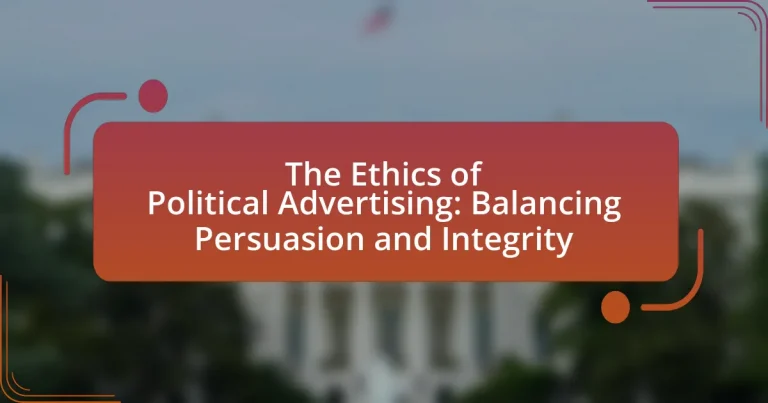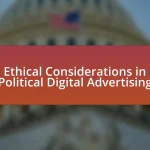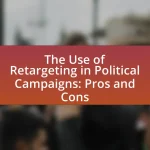The article examines the ethical considerations in political advertising, focusing on truthfulness, transparency, and the potential for manipulation. It highlights how political ads influence voter behavior through psychological tactics, such as emotional appeals and fear-based messaging, which can significantly affect decision-making. The discussion includes the importance of maintaining integrity in political advertising, the consequences of misinformation, and strategies for candidates to ensure honesty and transparency in their messaging. Additionally, it addresses the role of regulatory bodies in overseeing political ads and the impact of unethical practices on democracy and voter engagement.
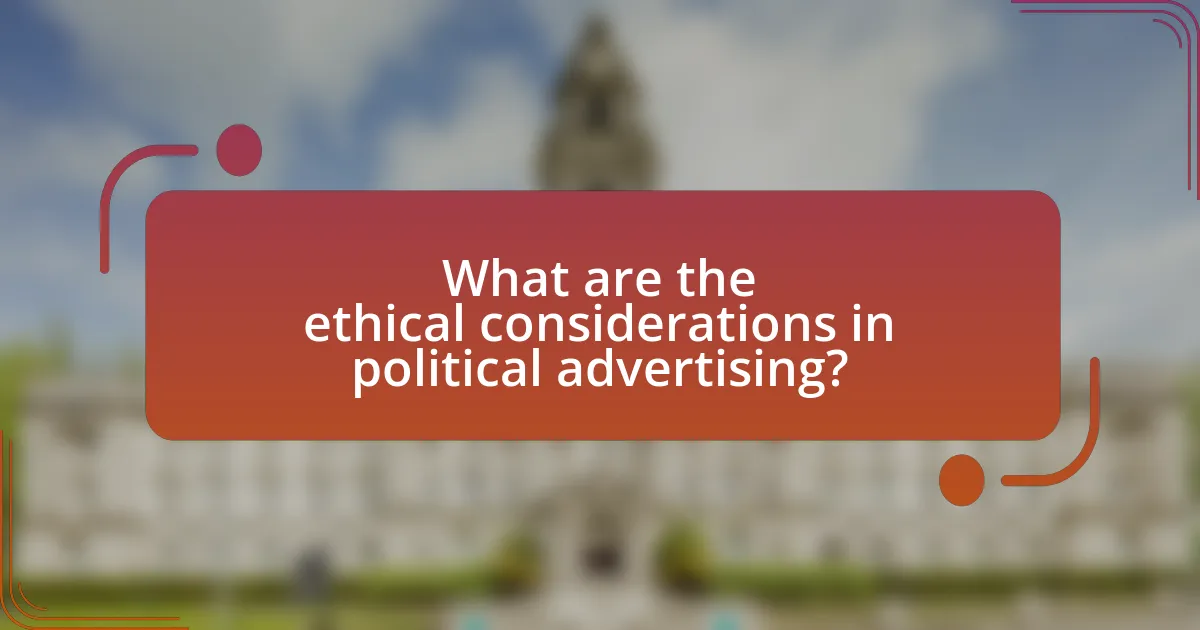
What are the ethical considerations in political advertising?
Ethical considerations in political advertising include truthfulness, transparency, and the potential for manipulation. Political advertisements must accurately represent candidates’ positions and avoid misleading claims, as false information can undermine democratic processes. Transparency about funding sources is crucial, as undisclosed financial backers can create conflicts of interest and erode public trust. Additionally, the use of emotional appeals and psychological tactics raises concerns about manipulation, as these strategies can exploit voters’ fears and biases rather than fostering informed decision-making. These ethical principles are essential for maintaining integrity in the political advertising landscape.
How does political advertising influence voter behavior?
Political advertising significantly influences voter behavior by shaping perceptions, attitudes, and ultimately voting decisions. Research indicates that targeted advertisements can effectively sway undecided voters by highlighting specific issues or candidate traits that resonate with their values. For instance, a study by the Pew Research Center found that 62% of voters reported that political ads impacted their views on candidates, particularly when ads addressed personal concerns like healthcare or the economy. This demonstrates that the strategic use of messaging in political advertising can lead to measurable changes in voter preferences and turnout.
What psychological tactics are commonly used in political ads?
Political ads commonly utilize psychological tactics such as fear appeals, emotional appeals, and social proof to influence voter behavior. Fear appeals leverage anxiety about potential threats, prompting voters to support candidates who promise safety and security; for instance, ads that highlight crime rates often aim to evoke fear and drive support for law-and-order candidates. Emotional appeals engage voters’ feelings, using narratives that resonate on a personal level, such as stories of hardship or triumph, which can create a strong connection to a candidate. Social proof involves showcasing endorsements or testimonials from respected figures or groups, suggesting that if others support a candidate, the viewer should too, thereby leveraging the psychological principle of conformity. These tactics are effective because they tap into fundamental human emotions and social behaviors, making them powerful tools in political advertising.
How do emotional appeals affect voter decision-making?
Emotional appeals significantly influence voter decision-making by tapping into feelings such as fear, hope, and anger, which can override rational analysis. Research indicates that voters are more likely to be swayed by messages that evoke strong emotions, as these feelings can create a sense of urgency and personal connection to the issues presented. For example, a study published in the journal “Political Psychology” by Brader (2006) found that emotionally charged advertisements increased voter turnout by 10% compared to neutral ads. This demonstrates that emotional appeals can effectively mobilize voters and shape their preferences, often leading to decisions based more on emotional resonance than on factual information.
What role does truthfulness play in political advertising?
Truthfulness is essential in political advertising as it fosters trust between candidates and voters. When political advertisements are truthful, they provide accurate information that enables voters to make informed decisions. Research indicates that misleading advertisements can lead to voter cynicism and disengagement, undermining the democratic process. For instance, a study by the Pew Research Center found that 70% of Americans believe that political ads often contain false information, which can diminish the credibility of the political system. Thus, truthfulness in political advertising not only enhances the integrity of the electoral process but also promotes a more informed electorate.
What are the consequences of misinformation in political campaigns?
Misinformation in political campaigns leads to significant consequences, including voter manipulation, erosion of public trust, and polarization of society. Voter manipulation occurs when false information sways public opinion, resulting in decisions based on inaccuracies rather than facts. For instance, a study by the Pew Research Center found that 64% of Americans believe fabricated news stories cause confusion about basic facts. Erosion of public trust manifests as citizens become skeptical of all political messaging, undermining democratic processes. Additionally, misinformation fosters societal polarization, as individuals gravitate towards echo chambers that reinforce their beliefs, further dividing communities. This cycle of misinformation can destabilize political discourse and hinder effective governance.
How can transparency enhance the integrity of political advertising?
Transparency enhances the integrity of political advertising by ensuring that information regarding funding sources, message origins, and target audiences is openly disclosed. This openness allows voters to critically assess the motivations behind advertisements, reducing the likelihood of misinformation and manipulation. For instance, research from the Pew Research Center indicates that 70% of voters believe that knowing who funds political ads is crucial for understanding their credibility. By fostering an environment where the origins and intentions of political messages are clear, transparency builds trust between candidates and the electorate, ultimately promoting a healthier democratic process.
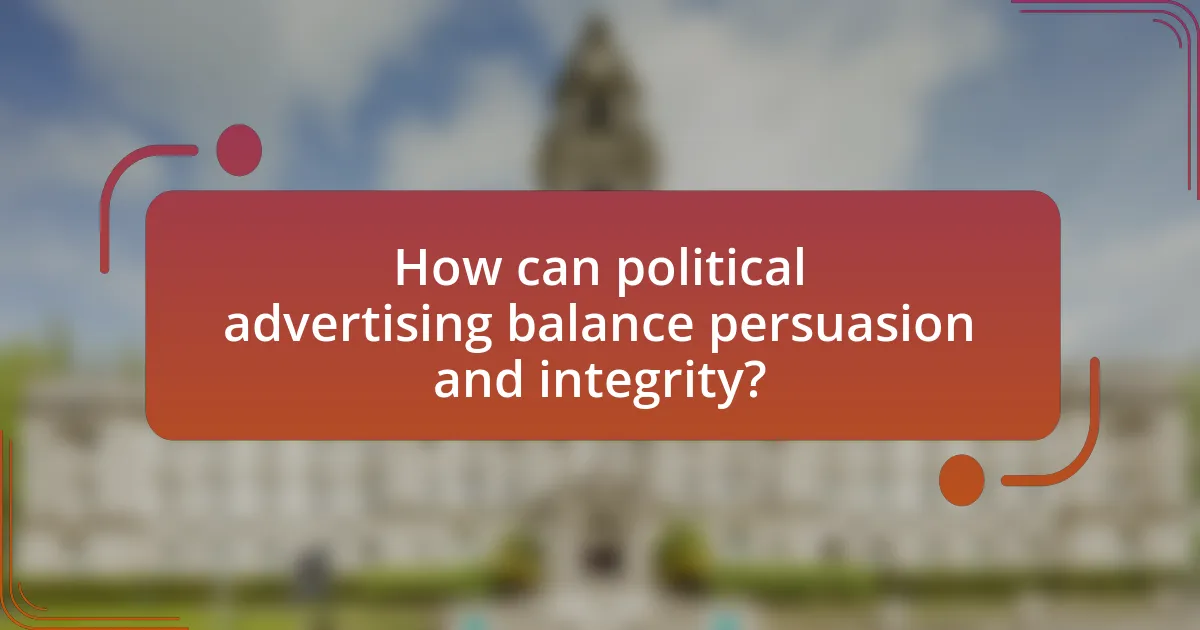
How can political advertising balance persuasion and integrity?
Political advertising can balance persuasion and integrity by adhering to ethical standards while employing transparent messaging strategies. Ethical standards, such as truthfulness and accountability, ensure that advertisements do not mislead voters, fostering trust. For instance, the American Association of Political Consultants emphasizes the importance of honesty in political messaging, which can enhance credibility and voter engagement. Additionally, using data-driven insights to understand voter concerns allows campaigns to craft persuasive messages that resonate without compromising factual accuracy. This approach not only persuades but also maintains the integrity of the political process, as seen in successful campaigns that prioritize ethical communication.
What strategies can be employed to maintain ethical standards?
To maintain ethical standards in political advertising, organizations can implement transparency, accountability, and adherence to established guidelines. Transparency involves clearly disclosing the sources of funding and the intent behind advertisements, which fosters trust among the audience. Accountability can be achieved through regular audits and evaluations of advertising practices to ensure compliance with ethical norms. Adhering to established guidelines, such as those set by the Federal Election Commission, provides a framework for ethical conduct. Research indicates that campaigns that prioritize these strategies are more likely to build public trust and avoid misinformation, as evidenced by studies showing that transparency in political messaging correlates with higher voter confidence.
How can candidates ensure honesty in their messaging?
Candidates can ensure honesty in their messaging by adhering to factual accuracy and transparency in their communications. This involves verifying all claims made in advertisements and speeches against credible sources, such as research studies or official statistics. For instance, a candidate can reference data from the Pew Research Center, which provides reliable insights into public opinion and demographic trends, to support their statements. Additionally, candidates should disclose any potential conflicts of interest and be open about their funding sources, as transparency fosters trust with the electorate. By committing to these practices, candidates can maintain integrity and credibility in their political messaging.
What guidelines exist for ethical political advertising?
Ethical political advertising guidelines include truthfulness, transparency, and respect for the audience. These principles ensure that advertisements do not mislead voters, disclose funding sources, and avoid exploiting sensitive issues. For instance, the Federal Election Commission mandates that political ads clearly identify their sponsors, promoting accountability. Additionally, organizations like the American Association of Political Consultants advocate for honesty and integrity in messaging, emphasizing that misleading claims can undermine democratic processes.
Why is it important to balance persuasion with ethical considerations?
Balancing persuasion with ethical considerations is crucial to maintain trust and integrity in communication. When persuasion techniques are employed without ethical guidelines, they can lead to manipulation, misinformation, and exploitation of audiences, undermining democratic processes. Research indicates that ethical advertising fosters transparency and accountability, which are essential for informed decision-making among voters. For instance, a study by the American Psychological Association highlights that ethical persuasion enhances credibility and strengthens relationships between advertisers and their audience, ultimately benefiting the political landscape.
What impact does ethical advertising have on public trust?
Ethical advertising significantly enhances public trust. When advertisers adhere to ethical standards, they demonstrate transparency, honesty, and respect for consumer rights, which fosters a positive relationship with the audience. Research by the American Marketing Association indicates that 91% of consumers are more likely to trust brands that engage in ethical advertising practices. This trust translates into increased brand loyalty and consumer engagement, as individuals feel more secure in their purchasing decisions when they believe that the information presented is truthful and responsible.
How can ethical lapses in advertising affect election outcomes?
Ethical lapses in advertising can significantly sway election outcomes by misleading voters and eroding trust in candidates. For instance, false claims or deceptive messaging can create a distorted perception of a candidate’s qualifications or policies, leading to misinformed voting decisions. A notable example is the 2016 U.S. presidential election, where misinformation spread through social media influenced public opinion and voter behavior, ultimately impacting the election results. Studies indicate that voters exposed to misleading advertisements are more likely to change their preferences, demonstrating the tangible effects of unethical advertising practices on electoral processes.
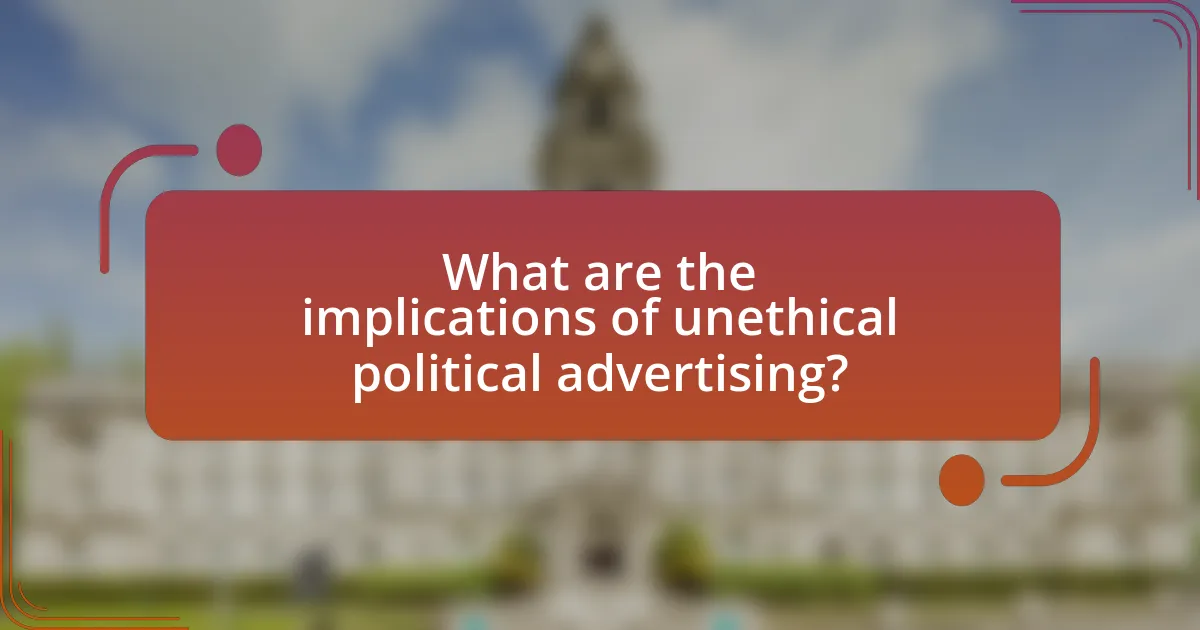
What are the implications of unethical political advertising?
Unethical political advertising undermines democratic processes by spreading misinformation and eroding public trust in political institutions. This type of advertising often manipulates emotions and distorts facts, leading to voter confusion and polarization. For instance, a study by the Pew Research Center found that 64% of Americans believe that fabricated news stories cause significant confusion about basic facts, which can directly influence electoral outcomes. Furthermore, unethical practices can lead to increased cynicism among voters, diminishing civic engagement and participation in the democratic process.
How does unethical advertising affect democracy?
Unethical advertising undermines democracy by distorting public perception and manipulating voter behavior. This occurs when misleading information is disseminated, leading to an uninformed electorate that cannot make rational decisions. For example, studies have shown that false claims in political ads can significantly influence voter opinions and choices, as evidenced by the 2016 U.S. presidential election, where misinformation spread through social media platforms affected public discourse and electoral outcomes. Such practices erode trust in democratic institutions and processes, ultimately weakening the foundation of democracy itself.
What are the long-term effects of misleading political ads on voter engagement?
Misleading political ads have long-term negative effects on voter engagement, leading to decreased trust in the electoral process and lower voter turnout. Research indicates that exposure to deceptive advertising can foster cynicism among voters, making them less likely to participate in future elections. A study by the Pew Research Center found that 70% of Americans believe that misleading information in political ads undermines democracy, which correlates with a decline in civic participation. Furthermore, a longitudinal analysis published in the Journal of Politics demonstrated that communities exposed to misleading ads experienced a significant drop in voter turnout in subsequent elections, highlighting the detrimental impact of such advertising on democratic engagement.
How can unethical practices undermine electoral processes?
Unethical practices can significantly undermine electoral processes by eroding public trust and distorting the democratic process. For instance, misinformation campaigns can mislead voters about candidates or policies, leading to uninformed decision-making. A study by the Pew Research Center found that 64% of Americans believe fabricated news stories cause confusion about basic facts, which can directly impact voter behavior. Additionally, practices such as voter suppression and gerrymandering manipulate electoral outcomes, disenfranchising certain groups and skewing representation. The Brennan Center for Justice reported that states with strict voter ID laws saw a decrease in voter turnout, particularly among minority populations, illustrating how unethical tactics can compromise the integrity of elections.
What can be done to combat unethical political advertising?
To combat unethical political advertising, implementing stricter regulations and transparency requirements is essential. Regulatory bodies can enforce rules that mandate clear disclosure of funding sources for political ads, ensuring that voters are aware of who is behind the messaging. For instance, the Federal Election Commission in the United States requires disclosure of campaign ad sponsors, which helps to mitigate misleading information. Additionally, promoting media literacy among the public can empower individuals to critically evaluate political advertisements and recognize deceptive practices. Research indicates that informed voters are less susceptible to manipulation, thereby enhancing the integrity of the electoral process.
What role do regulatory bodies play in overseeing political ads?
Regulatory bodies play a crucial role in overseeing political ads by enforcing laws and guidelines that ensure transparency, accuracy, and fairness in political advertising. These organizations, such as the Federal Election Commission in the United States, monitor campaign finance, requiring disclosure of funding sources and expenditures. They also investigate complaints regarding misleading or false advertisements, thereby maintaining the integrity of the electoral process. For instance, the Federal Election Commission has the authority to impose fines and penalties on campaigns that violate advertising regulations, reinforcing accountability in political messaging.
How can voters identify and respond to unethical advertising practices?
Voters can identify unethical advertising practices by critically analyzing the content for misinformation, emotional manipulation, and lack of transparency regarding funding sources. For instance, advertisements that present misleading statistics or omit crucial context can be flagged as unethical. Voters should respond by reporting such ads to regulatory bodies like the Federal Election Commission and engaging in discussions on social media to raise awareness. Research indicates that 70% of voters are more likely to trust candidates who openly disclose their funding sources, highlighting the importance of transparency in political advertising.
What best practices should candidates follow in political advertising?
Candidates should prioritize transparency and honesty in political advertising. This involves clearly disclosing the sources of funding for advertisements and ensuring that all claims made are factually accurate. Research indicates that transparency in political ads can enhance voter trust; for instance, a study by the Pew Research Center found that 70% of voters are more likely to support candidates who are open about their funding sources. Additionally, candidates should avoid misleading information and focus on constructive messaging that addresses the needs and concerns of their constituents. By adhering to these best practices, candidates can maintain ethical standards while effectively communicating their platforms.
